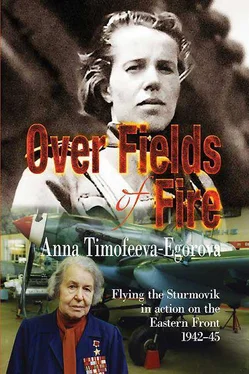Through the bars on the window I saw a Gestapo man and two submachine-gunners with him were running into the French barracks and shooting: apparently they were finishing off those who couldn’t walk… But then the cannon shots, previously reaching the camp like a far-off roar of thunder, began to resound just nearby. The shells were bursting right and left of the punishment cell, which had been locked. There had been no one on guard for quite some time already. And suddenly everything fell silent. A lull set in. Suddenly the door swung open and I saw our tank-men in it… How happy I was! “They’ll fix me up for sure”, I thought. “I’ll get better myself — such is my character!”
Major Ilyin — the tank brigade commander — advised me go to hospital with the wounded tank crews who were about to be taken away in carts. He knew that I would be going through hard times — apparently he was aware of our SMERSh 171 171 Translator’s note — abbreviation of a special security service of the Soviet Army, also nicknamed ‘Death to the Spies’.
. That’s was why he recommended I lose myself among the wounded tank-men. He said: “You were flying at tanks when they shot you down!” But I found out the 16th Aerial Army in which I used to serve was operating towards here. That was why I declined:
“I will be looking for my regiment. It must be somewhere here, on this sector of the front.”
With the tank crews’ field mail service, I immediately sent letters to my mum in the village of Volodovo, Kouvshinovskiy Region, and to the regiment. Because of the happiness, that day I got to my feet and walked. I remember I put on those gift slippers with red stars on the toes, made by an unknown friend for me, braced my hands against the bunk and moved forward. But my legs were trembling like strings, my flabby muscles wouldn’t obey me, my burns had just grown over and began to crack and bleed straightaway… “Stop! Sit down for a bit, have a rest”, I said to myself and then carefully shuffled around the floor again. One more step! I swayed but didn’t fall, stayed upright and walked on, although holding onto the wall…
And the ex-POWs of the camp, those who could hold weapons, climbed up on the tanks and went into the battle for Küstrin. Sinyakov organized a field hospital in the camp at the tank crews’ request: their rear lines had fallen behind during their rapid advance. Georgiy Fedorovich did more than seventy operations on wounded tank-men over several days. And back then, in the camp, immediately after the liberation he brought my Party membership card and decorations and handed them over to me…
Iam careful with my memory — generally I try not be carried away by recollections. Memory is memory and life is life. Nevertheless, I have to tell my grandchildren and great-grandchildren the truth. That truth that when the fighting near Küstrin had died down and the rear lines had caught up, all of us survivors, now ex-prisoners of the Küstrin camp, were ordered to walk to the city of Landsberg — for a check-up. I could barely walk, but there was a horse-driven waggon on the road, and Doctor Sinyakov talked a coachman into giving me a lift to the nearest town, to where the soldier was heading. Georgiy Fedorovich told me to wait for them by the first building at the entrance to the town. The soldier helped me: he lifted me off his wreck, took me to the proper place, helped meto sit down. But I didn’t have to wait long. As soon as I had sat down on a bench, an officer with a sabre and two soldiers with submachine-guns on both his sides came up to me. “Who are you?” I explained: “Doctors are coming to pick me up shortly. They will assist me in getting to the town for a check-up”. “You know, we should feed you! You must be starving!” I thought it was a bit strange. He was behaving in an unpleasant, affected way. And he also had quite a ‘professional-looking’ face. And they lifted me up under the arms, took my straw handbag and off I strode through the prostrate German town. The dashing officer was in front of us, and the two soldiers were holding me under the arms… I plodded along and the tears were running… I was wearing the jacket ‘cut to the latest Warsaw fashion’, that gift from the British POWs. On the jacket were my two Orders of the Red Banner, the Order of the Red Star, the medals ‘For Valour’ and ‘For the Defence of the Caucasus’: the Party membership card was in my breast pocket. My hair, singed by the fire, had just begun to grow out and that was why I’d covered my head with the warm scarf — it was a gift from the Yugoslav peasant from the Banat province — Zhiva Lazin.
So I walked through the town — in such a uniform, slippers made of trenchcoat smooth woolen with red stars on the toes, escorted by a ‘guard of honour’. “Soon you will have a dinner and everything else!”
I was brought to a commandant’s office — to a Soviet officer who was a town major. Without hesitation, with no particular formality or interrogation of a ‘suspicious person’ he ordered me shoved into a vehicle, and then under a reinforced escort carried to the SMERSh Counter-espionage Section of the 32nd Rifle Corps of the 5th Shock Army. There I was ‘billeted’ on a trestle-bed in the watch-house and brought some kind of thick broth. Hitlerite POWs were downstairs in the basement, and I, thank God, was not with them but above them. As airmen say, I ‘had an altitude gauge’…
The very first night two soldiers with submachine-guns took me for an interrogation. I had to walk up a very steep stairway to the first floor of the building adjacent to the watch-house. My legs were not very responsive, the thin skin that had just appeared on the burns was cracking. The crooks of my arms and knee-joints were stinging and bleeding. But if I tried to stop — a soldier would push me in my back with his submachine-gun…
I was led into the room which was lit brightly. The walls were covered with paintings; a large carpet was placed on the floor. There was a major sitting behind the desk. He had benevolent looks — but he started by taking away my awards and the Party membership card. For a long time he did now allow me to sit: all that time he spent studying the items with such attention — using a magnifying glass. I thought I was just about to collapse but held on by drawing on some remaining strength, and kept asking for permission to sit down. At last the Major gave permission. I thought that no force would tear me off the chair now! But no, the ‘benevolent’ major suddenly barked:
“Get up!”
I sprang to my feet. And so they started, the questions rained down upon me: “Where did you take the decorations and the Party membership card from? Why did you give yourself up? What was your mission? Who gave you the mission? Where were you born? Who is your contact?”
The major kept asking me these and other questions in that order or mixed up, right up until morning. Whatever I said, he shouted the same thing: “You’re lying, you German shepherd!”
This was to go on for ten nights in a row! They escorted me to the toilet. Food was brought to me once a day at the same place — the watch-house, on the trestle-bed… I was snubbed with the dirtiest words… My name was forgotten: I now was ‘the Fascist Shepherd’.
I cannot forget how after the war was over I told about my ‘stay’ with the SMERSh to Petr Karev — the former commander of our regiment. It was the first time I ever talked to somebody about it — and I was crying almost hysterically And then Petr yelled:
“And you did what?! Why didn’t you remind him about flying reconnaissance missions in 1941 — on an unarmed U-2?! When in the same year your U-2 plane was set on fire, shot down by the German fighters — but being scorched with fire, you delivered the orders to our troops! And wasn’t it ever worse? All you have passed through? We took Kovel, Lutsk, Warsaw… Why didn’t you, a Sturmovik pilot, throw something at the mug of that scoundrel rear trooper!?..”
Читать дальше












